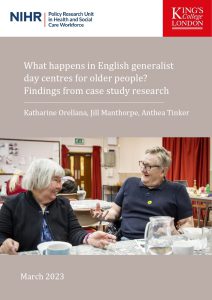Katharine Orellana is Research Fellow and Jill Manthorpe is Director at the NIHR Policy Research Unit in Health and Social Care Workforce at King’s. (420 words)
 A new report aims to improve the understanding of day centre services for older people among social care and health professionals and potential collaborators.
A new report aims to improve the understanding of day centre services for older people among social care and health professionals and potential collaborators.
The Covid-19 pandemic led to a greater appreciation of everyone’s need for in-person, face-to-face contact and the difficulties facing some older people when they could no longer meet other people in their day centre when these closed temporarily. Now is the time for professionals to re-examine the value and broader use of these services, and their buildings and activities. Rather than continue to view day centres to be resource-heavy or expensive services, the focus could shift to what they do, and could offer – to individuals, their staff and volunteers, the social care sector, the wider community, local councils, the NHS, and the education sector. They have great potential to make preventive and early intervention approaches promoted by policy a local reality.
This report provides a rich, pre-Covid pandemic account of four very different English day centres for older people. It sets out their main characteristics, aims, approach, locality, interiors, formal and informal care provided, opening hours, available ‘extras’, charges made to attenders and, finally, ‘typical days’ at each.
These descriptions shed light on what makes ‘the day centre’ one of those multi-faceted ‘interventions’ (to use professional language) that each attender is likely to experience differently. Day centre services are complex and diverse, despite sharing common features: door-to-door accompanied transport to a fixed venue with varying facilities, a meal, refreshments, a group of peers, trained staff/volunteers who provide both care and emotional, physical and practical support, the opportunity to socialise and participate (or to witness without participating) a variety of structured or unstructured activities or be entertained, group outings, and access to other services or activities that local partnership working has facilitated.
Data included in this report are drawn from documents provided by managers of four purposively selected English day centres for older people, interviews with 23 centre managers, staff and volunteers, and notes made during 56 full-day visits. It is the most complete description of this service that means so much to many older people.
Katharine Orellana is Research Associate and Jill Manthorpe is Director at the NIHR Policy Research Unit in Health and Social Care Workforce at King’s.
This publication:
Orellana, K., Manthorpe, J., & Tinker, A. (2023) What happens in English generalist day centres for older people? Findings from case study research, London: NIHR Policy Research Unit in Health and Social Care Workforce, The Policy Institute, King’s College London. https://doi.org/10.18742/pub01-123